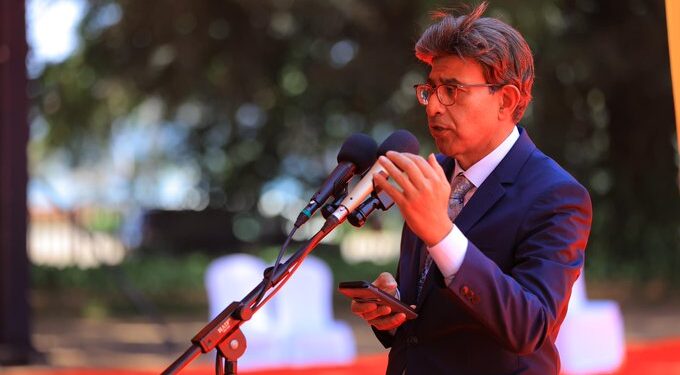Munyonyo – The Uganda Development Bank (UDB), in partnership with global and regional stakeholders, has convened the Uganda Development Finance Summit 2025 at Speke Resort Munyonyo, bringing together policymakers, financiers, academics, and industry leaders to deliberate on Africa’s socio-economic transformation.
The summit opened with a vibrant cultural showcase—poetry and traditional dance—before delegates turned to the serious business of reimagining Africa’s economic future. His Excellency President Yoweri Kaguta Museveni and the First Lady, Mama Janet Museveni, graced the event, signaling the national importance of the dialogue.
In his keynote address, President Museveni urged African leaders and economic managers to lead with clarity of vision and integrity. “The managers of Africa’s economies must have vision and integrity in order to make an impact. What do you want to achieve? At independence, African economies were producing only a few raw materials—the 3Cs: coffee, copper, and cotton, and the 3Ts: tobacco, tourism, and tea. If you come to manage this type of economy, what is your vision?” he challenged.

The summit’s theme, “A New Development Paradigm: Advancing Africa’s Transformation through Development Finance, Industrial Policy, and Private Sector Growth,” reflected the urgency of reshaping African economies for the future.
Arshad Rab, CEO of the European Organisation for Sustainable Development and Chairman of the International Sustainability Council, emphasized the historic opportunities of the present era. “We are in a new era, one in which many-fold growth of GDP is achievable within years rather than decades or centuries. This is an era defined by cutting-edge technologies, disruptive business models, innovation, and an unwavering commitment to building high-value economies that will shape the future of nations,” he said.
Rab further highlighted the role of development finance institutions. “The key role of a national development bank today is to facilitate the transformation of an economy from low or no value into one that is high-tech, high-value, inclusive, and environmentally sustainable. I thank UDB for hosting this summit and convening us for such a critical discussion,” he added.

He also underscored the urgency of mobilizing local resources. “Capital markets must become a defining part of the solution for mobilizing local capital to drive local development. A development agenda anchored on high-value addition is the surest path to ending generational poverty, ensuring that future generations have access to energy, education, healthcare, and an economy capable of absorbing a qualified workforce.”
UDB Managing Director, Dr. Patricia Ojangole, noted that Africa’s transformation must take place amid mounting global and domestic pressures. “Our continent is rich, yet challenged by global shifts—climate change, digital transformation, evolving trade dynamics, geopolitical tensions, the shrinking fiscal space amidst limited domestic revenue mobilization, greater need to create jobs for the youth, and the urgent need for socio-economic transformation,” she observed.
“In this era of complexity, one thing is clear: we must build resilient, inclusive, and locally anchored financial systems. And at the heart of this transformation lies the role of National Development Banks (NDBs),” Ojangole stressed.

UDB Board Chairman, Geoffrey Kihuguru, pointed to the urgency of the moment. “This summit comes at a time when the world is facing multiple and complex challenges, including escalating geopolitical tensions affecting global value chains, the lingering effects of the COVID-19 pandemic, and climate change with its profound impact on food security and trade performance—especially in countries that depend on agriculture,” he said.
“Africa must urgently create jobs for its rapidly growing, youth-dominated population. It is for this reason that UDB has organized this summit: to bring together stakeholders from diverse backgrounds and disciplines to deliberate on Africa’s development challenges, while identifying opportunities and innovative solutions that African and other developing countries can harness to accelerate socio-economic transformation and growth,” Kihuguru added.

During a fireside chat, Dr. Arkebe Oqubay, former Senior Minister in Ethiopia, emphasized the need for targeted industrial policy. “Industrial policy has to target strategic sectors based on clear criteria. From our perspective, it must be export-oriented. An economy that doesn’t focus on the international market and remains limited to the domestic market is not going to succeed,” he said.
He added that African countries must balance international support with self-reliance. “We must tap donor assistance where possible, but we also have to rely on domestic resources—and we must be in the driver’s seat.”

As the summit continues, participants are expected to explore frameworks for development finance, the role of industrial policy in structural transformation, and strategies for harnessing private sector growth to position Africa for a high-value, sustainable economic future.











